八下英语笔记
英语八年级下册第五单元笔记
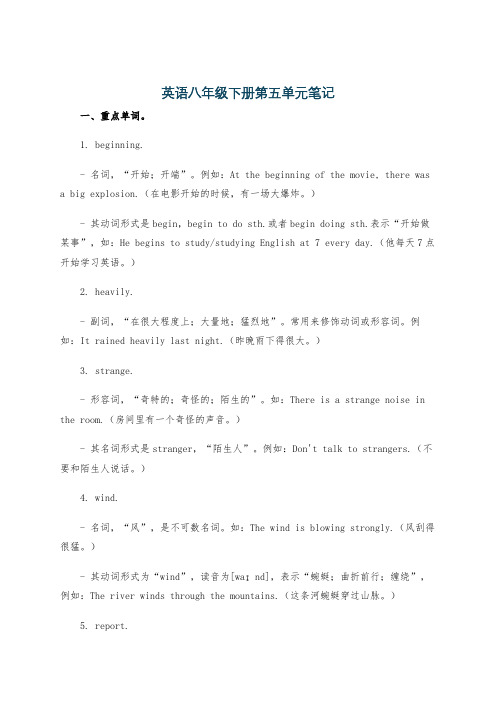
英语八年级下册第五单元笔记一、重点单词。
1. beginning.- 名词,“开始;开端”。
例如:At the beginning of the movie, there was a big explosion.(在电影开始的时候,有一场大爆炸。
)- 其动词形式是begin,begin to do sth.或者begin doing sth.表示“开始做某事”,如:He begins to study/studying English at 7 every day.(他每天7点开始学习英语。
)2. heavily.- 副词,“在很大程度上;大量地;猛烈地”。
常用来修饰动词或形容词。
例如:It rained heavily last night.(昨晚雨下得很大。
)3. strange.- 形容词,“奇特的;奇怪的;陌生的”。
如:There is a strange noise in the room.(房间里有一个奇怪的声音。
)- 其名词形式是stranger,“陌生人”。
例如:Don't talk to strangers.(不要和陌生人说话。
)4. wind.- 名词,“风”,是不可数名词。
如:The wind is blowing strongly.(风刮得很猛。
)- 其动词形式为“wind”,读音为[waɪnd],表示“蜿蜒;曲折前行;缠绕”,例如:The river winds through the mountains.(这条河蜿蜒穿过山脉。
)5. report.- 名词,“报告;报道”。
例如:I read a report about the accident in the newspaper.(我在报纸上读到了一篇关于这个事故的报道。
)- 动词,“报道;公布”。
如:The journalist reported the news on TV.(这位记者在电视上报道了这条新闻。
八年级下册第六单元英语笔记
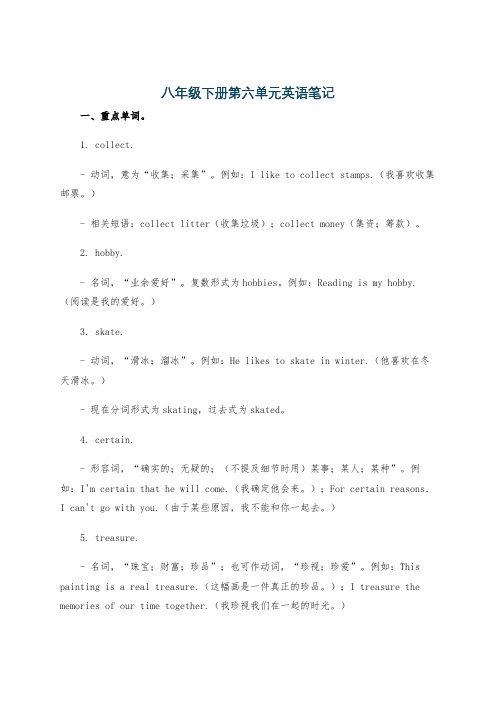
八年级下册第六单元英语笔记一、重点单词。
1. collect.- 动词,意为“收集;采集”。
例如:I like to collect stamps.(我喜欢收集邮票。
)- 相关短语:collect litter(收集垃圾);collect money(集资;筹款)。
2. hobby.- 名词,“业余爱好”。
复数形式为hobbies。
例如:Reading is my hobby.(阅读是我的爱好。
)3. skate.- 动词,“滑冰;溜冰”。
例如:He likes to skate in winter.(他喜欢在冬天滑冰。
)- 现在分词形式为skating,过去式为skated。
4. certain.- 形容词,“确实的;无疑的;(不提及细节时用)某事;某人;某种”。
例如:I'm certain that he will come.(我确定他会来。
);For certain reasons, I can't go with you.(由于某些原因,我不能和你一起去。
)5. treasure.- 名词,“珠宝;财富;珍品”;也可作动词,“珍视;珍爱”。
例如:This painting is a real treasure.(这幅画是一件真正的珍品。
);I treasure the memories of our time together.(我珍视我们在一起的时光。
)6. island.- 名词,“岛”。
例如:There is a beautiful island in the sea.(海里有一个美丽的岛。
)7. page.- 名词,“(书刊或纸张的)页;面;张”。
例如:Turn to page 10.(翻到第10页。
)8. hurry.- 动词,“匆忙;赶快”;名词,“匆忙;急忙”。
- 常用短语:hurry up(赶快;急忙(做某事));in a hurry(匆忙地;急于)。
例如:Hurry up, or we'll be late.(快点,否则我们要迟到了。
八下英语笔记
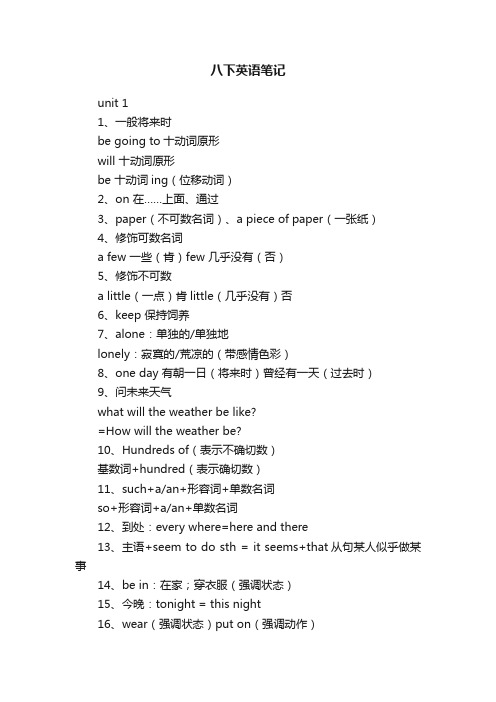
八下英语笔记unit 11、一般将来时be going to十动词原形will 十动词原形be 十动词ing(位移动词)2、on 在……上面、通过3、paper(不可数名词)、a piece of paper(一张纸)4、修饰可数名词a few 一些(肯)few 几乎没有(否)5、修饰不可数a little(一点)肯little(几乎没有)否6、keep 保持饲养7、alone:单独的/单独地lonely:寂寞的/荒凉的(带感情色彩)8、one day 有朝一日(将来时)曾经有一天(过去时)9、问未来天气what will the weather be like?=How will the weather be?10、Hundreds of(表示不确切数)基数词+hundred(表示确切数)11、such+a/an+形容词+单数名词so+形容词+a/an+单数名词12、到处:every where=here and there13、主语+seem to do sth = it seems+that从句某人似乎做某事14、be in:在家;穿衣服(强调状态)15、今晚:tonight = this night16、wear(强调状态)put on(强调动作)dress sb (给某人穿衣服)be in(强调状态)17、help sb( to) do sth(帮助某人做某事)help sb with sth(在某方面帮助某人)18、疑问词+do yor think+主+谓+其他Belive+that 从句19、…ago(…以前)用一般过去时宾语从句→用陈述句(主+谓)fly to +地点“in+一段时间”用“Hou long”提问There will be +主+其它(将会有)20、live to be + 年龄(活到…岁)it is +形+(for sb)to do sth对某人来说做某事怎么样look up (查找)fall in love with 人/物(爱上某人或某物)be able to = can(能;会)There be sb doing sth (有人正在做某事)worry about sb (担心某人)be used for (用来做什么)unit 21、某人怎么了?what`s wrong with sb?what`s the matter with sb?what`s the trorble with sb?what`s up?2、给某人打电话?Call sb up = ring sb up3、你认为某人某物怎么样?what do you think of sb/sth?=How do you like sb/sth?4、对主语来说borrow sth from sb (借进)lend sth to sb (借出)5、为某人买某物buy sth for sb = buy sb sth6、either(句末)否too (句末)肯also(在句中be动词/情/助之后,实义动词前肯)7、把某物归还某人return sb sth =return sth to sb和某人打架fight with sb = have a fight with sb8、get on 上车、相处建议advice (名)advise(动)9、各种各样all kinds of参加take part in+活动join+组织compare…with(与…比较)compare…to(把…比作)10、find sb doing sth 发现某人正在做某事advice sb to do sth 建议某人做某事see sb doing sth 看见某人正在做某事ask sb for help 寻求帮助argue with sb 与某人争论11、enough(修饰形/副词时enough 放在后)call sb at…(拨打电话…找…)特殊疑问词+动词不定式(to+动词原形)相当于名词:It`s time for +名(该是…时候)= It`s time to do sth13、sb spend 时间/钱+(in)doing sthsb spend 时间/钱+on sth(某人花费多少时间/钱做某事)sb+pay+钱for sth (某人为…付…钱)物+cost+sb+钱(某物花费某人多少钱?)It takes sb+时间to do sth(某花人费多少时间做某事)14、告诉某人(不要)做某事tell sb to do sthtell sb (not) to do sthmay be (也许)副may be(可能是)谓语unit 31、was/were+动ing (过去进行时)get out of (从…出来)be interested in(对…感兴趣)over = more than (超出)about = around(大约)2、when:两个动作可以同时发生、先后发生while:两个动作同时发生,从句常用进行时3、到达:arrive at + 小地点arrive in + 大地点get to + 地点reach + 地点4、imagine doing sth (想象做某事)imagine + that 从句5、感叹句what + a/an+单数名词+主+谓!how + 形/副+主+谓!6、shout at sb(对…大声喊)有责备之意Shout to sb (对…高声叫喊)7、in a tree(外来人或物在树上)on a tree(本身长在树上)发生:happen(偶然发生)、take place(计划中的事情)8、somewhere (某处)肯anywhere (任何地方)否定句或疑问问中everywhere (到处)肯定9、最后:finally(副)=at last =in the end10、evevy(日常的)形every day (每天)用在一般现在时unit 41、be mad at sb = be angry with sb 对某人生气不再not…anymore = no more (be动词之后,实义动词前) be supposed to=should 应该;应当be supposed to do sth 应当做某事2、take a message for sb 给某人捎口信leave a message 留口信3、be good at=do well in 擅长…+ed 的形容词→修饰人+ing的形容词→修饰物做某事遇到困难:have a hard time with sthhave a hard time doing sthwant to know = wonder 想知道4、be nervous 紧张的get nervous 变得紧张feel nervous 感到紧张luck(名)幸运lucky(形)幸运的ludeily(副)幸运地决定:decision(名词)>decide(动词)decide to do sth决定的做某事out of danger (脱离危险)in danger 危险(名词)dangerous 危险的(形容词)5、both…and(两者都)between…and (两者)之间open up one`s eyes (使某人开眼界)unit 51、let out 允许出去let in 允许进入or 用在否定/一般疑问句中and,用在肯定句中2、want sb to do sth 想要某人做某事ask sb to do sth 叫某人做某事3、why not +动词原形=why don`t you+动词原形all over the world = around the world 世界各地4、以…而闻名:be famous as +职业be famous for+原因cook 名词:厨师;动词:做饭cooker 炊具;cook sth for sb,为某人做某东西5、spend time with sb 和某人共度时光laugh at sb 嘲笑某人make +人+形容词(使某人处在…状态)had better (not) do sth 最好(不)做某事6、If+一般现在时,主句一般将来时7、make money 赚钱make a living(by)doing sth 靠做某事谋生8、be against sb/sth 反对某人/某事unit 61、现在完成进行时:have /has+been+动ing 现在完成进行时:①用for+一般时间②Since+过去时间点③Since+从句④Since+┅ago2、raise sth for sb 为某人筹集某物Several=a few基数词+and a half year=基数词+years and a half3、collect 收藏(动词)collector 收藏家(动词)collection 收藏品(名词)4、anyone=anybody作主语时,谓语动词用单数,用在否定句/疑问名/条件状语从语5、on one`s+序数词+birthday在某人的第几个生日6、finish doing sth 完成做某事7、准确数:基数+thousand不准确数:thousand+of8、How much ①对价钱提问;②对不可数名词数量提问9、be certain that从句(确信…)10、It`s+形容词+(for sb)+to +do+sth对某人来说,做某事怎么样11、“the+形容词比较级、the+形容词比较级”“越…越…”“形容词的比较级+and形容词比较级”“越来越…”12、enjoy doing sth“喜欢做某事”hear+that 从句(陈述句)14、East 东方东方的South 南方南方的+ernWest 西方西方的north 北方北方的15、far away 在远处far from 离…远16、用光run out of 主语是人run out 主语是物unit 71、Would you mind(not)doing sth? =Would you mind+if 从句你介意(不)做…吗?2、回答:不介意:①No,not at all②certainly not③of course not介意:①I`m sorry but…②I`m afraid…③Yes,You`d better not…3、right away (立刻,马上)=at once=right now →用在将来的时态中=in a minute4、Could you please (not)do sth?请你(不)做…好吗?5、工作任务work(不可数名词)job(可数名词)task (可数名词)它是一个令人困难、疲倦的工作6、complain about sth 抱怨做某事give---gave---givenbring---broughtbuy---boughtchoose---chose---chosen7、sth doesn't work=There is some thing wrong with sth某东西坏了8、形容词:annoying 使…生气的(物)annoyed 生气的(人)annoy 使…生气(动词)9、be friendly to sb 对某人友好be polite to sb 对某人有礼貌10、try to do sth 尽力做某事try not to do sth 尽力不做某事11、the way to +地点welcome to +地点(欢迎来到某地)12、否定前缀polite---impolite 礼貌Possible---impossible 可能13、小心:take care = be careful = look out take care to do sth小心做某事14、pick up:捡起;接人;搭车15、allow sb (not)to do sth允许某人(不)做某事be(not)allowed to do sth (不)被允许做某事17、keep(on) doing sth 继续做某事18、sth happens to sb 某事发生在某人身上happen to do sth 碰巧…19、即使even if =even thoughunit 81、why don't you do sth?=why not do sth?你为什么不做…2、get sb sth=get sth for sb给某人买某物3、How about…?=what about…?……怎么样4、scarf的复数,将f改为v,再加es scaves6、感叹句What+a/an+形+名词单数+主谓!What+形+名词复数/不可数名+主+谓!How+形/副+主+谓7、合成形容词基数词---单数名词---形容词例:5---year---old 5岁的8、too…to+动原形太…而不能…so…that 从句如此…以致not…enough to+动原形不够…做…9、called=named not…at all 一点也不10、be interested in…=take an interest in…对…感兴趣11、sleep(动、名)asleep(形、只作表语)sleepy (困倦的,有睡意的,但没有睡着,作定语)12、too many+可数名词的复数太多too much+不可数名词much too (太)14、rather than = instead of 而不是16、nearly=almost 几乎hardly 几乎不17、suggest(动)建议suggestion(名)可数名词不可数名词:advice18、suggest doing sth建议做某事make sb do sth让某人做某事encourage sb to do sth鼓励某人做某事20、除…之外except:(除…之外,其他都…)后面的人或物被排除在外besides(除…之外,还有…)后面的人或物包括在内make friends with sb和某人交朋友21、share sth with sb 和某人分享某物make progress 取得进步unit 91、have / has been to +地点曾经去过某地(不在原地,已回来)have / has gone to + 地点去了某地(去的路上/到了那个地方)2、neithor的用法(两者都不)1)neither+单数名词2)neithor of +人称代词/名词复数3)neither+be/助/情态动词+另一个主语(上面提到的否定情况,也适用于另一个主语)4)neither…nor…既不…也不…3、end up with=finish doing sth 以…结束4、在现在完成时中,短暂性动词不能与一段时间连用,必须转化延续性动词。
八下英语五单元笔记
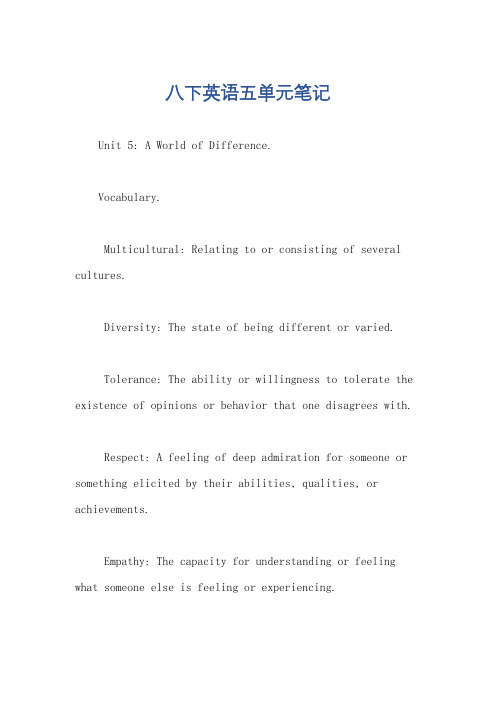
八下英语五单元笔记Unit 5: A World of Difference.Vocabulary.Multicultural: Relating to or consisting of several cultures.Diversity: The state of being different or varied.Tolerance: The ability or willingness to tolerate the existence of opinions or behavior that one disagrees with.Respect: A feeling of deep admiration for someone or something elicited by their abilities, qualities, or achievements.Empathy: The capacity for understanding or feeling what someone else is feeling or experiencing.Grammar.Present perfect tense: Used to describe actions or events that started in the past and continue to the present or have recently finished.Past perfect tense: Used to describe actions or events that happened before another action or event in the past.Comparative and superlative adjectives: Used to compare two or more things or people.Reading Comprehension.Passage 1: The Importance of Cultural Diversity.Cultural diversity is essential for a thriving and vibrant society. It brings together people from different backgrounds, experiences, and perspectives, creating a rich tapestry of traditions, beliefs, and values. Each culture contributes its unique flavor to the collective whole, making it more dynamic and resilient.Diversity promotes creativity and innovation. When people from diverse backgrounds come together, they share their ideas and perspectives, leading to new and innovative solutions. It also fosters tolerance and understanding. By interacting with people from different cultures, we develop empathy and a greater appreciation for the ways of lifethat differ from our own.Furthermore, cultural diversity is crucial for economic prosperity. It attracts global talent and investment, creating jobs and stimulating economic growth. It also helps businesses cater to diverse customer bases and expand into new markets.Passage 2: The Challenges of Cultural Diversity.While cultural diversity offers many benefits, it also presents challenges. Differences in language, customs, and beliefs can lead to misunderstandings, conflicts, and even discrimination. Prejudice and stereotypes can hinder communication and cooperation.Overcoming these challenges requires active effort and a commitment to respect and tolerance. It involves educating ourselves about different cultures, listening to others' perspectives, and valuing their contributions. By fostering empathy and open-mindedness, we can create a society where everyone feels included and respected.Listening.Dialogue 1: A Conversation about Cultural Diversity.Speaker 1: I think cultural diversity is so important. It makes our society so much more interesting and vibrant.Speaker 2: I agree. It's fascinating to learn about different cultures and traditions.Speaker 1: But it can also be challenging sometimes. Different cultures have different values and beliefs, which can lead to misunderstandings.Speaker 2: That's true. But I think it's important to try to understand and respect each other's differences.Dialogue 2: A Discussion about the Challenges of Diversity.Speaker 1: I'm worried about the challenges of diversity. I think it can lead to division and conflict.Speaker 2: I can understand your concerns. But I believe that the benefits of diversity outweigh the challenges.Speaker 1: Maybe you're right. But I think we need to be careful to avoid letting our differences divide us.Speaker 2: I agree. We need to work together to create a society where everyone feels included and respected.Speaking.Discussion Topics.The importance of cultural diversity in society.The challenges of cultural diversity and how to overcome them.Personal experiences with cultural diversity.Presentation Tips.Choose a topic that you are passionate about.Research your topic thoroughly.Organize your ideas clearly and logically.Use vivid language and examples to engage your audience.Practice your presentation several times.Be confident and enthusiastic.。
人教部编版八年级英语下册第二单元笔记重点汇总(可直接打印)
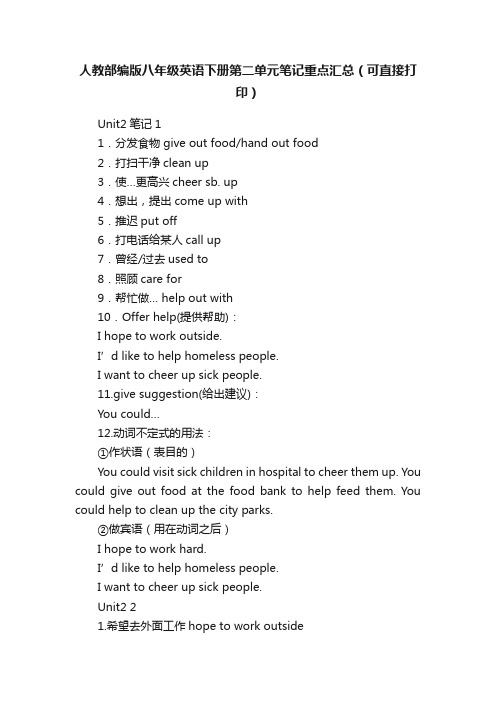
人教部编版八年级英语下册第二单元笔记重点汇总(可直接打印)Unit2笔记11.分发食物give out food/hand out food2.打扫干净clean up3.使…更高兴cheer sb. up4.想出,提出come up with5.推迟put off6.打电话给某人call up7.曾经/过去used to8.照顾care for9.帮忙做… help out with10.Offer help(提供帮助):I hope to work outside.I’d like to help homeless people.I want to cheer up sick people.11.give suggestion(给出建议):You could…12.动词不定式的用法:①作状语(表目的)You could visit sick children in hospital to cheer them up. You could give out food at the food bank to help feed them. You could help to clean up the city parks.②做宾语(用在动词之后)I hope to work hard.I’d like to help homeless people.I want to cheer up sick people.Unit2 21.希望去外面工作hope to work outside2.帮助摆脱饥饿help stop hunger(名词)3.食物赈济处food bank4.课后学习活动an after-school study program5.想出/提出一个计划come up with a plan6.推迟制定计划put off making a plan7.张贴标语put up signs8.写一些公告make some notices9.需要做某事need to do …10.在敬老院in an old people’s home11.让某人做某事ask sb. to do …12.帮助解决某事help out with sth.13.给我讲过去的故事tell me stories about past14.是孤独的/感觉孤独be lonely / feel lonely15.听/倾听listen to16.照顾他们care for themSection A 3a 笔记1.students who volunteer 做志愿服务的学生2.give up several hours to do sth.花费几个小时去做某事(动词不定式表目的)spend several hours doing sth. 花费几个小时做某事3.give up doing sth. 放弃做某事4.get such a strong feeling of satisfaction/joy 产生如此强烈的满足感/喜悦感get a feeling of happiness / joy / being helpful / satisfaction 产生幸福/快乐/助人/满足感5.the look of joy 快乐的表情6.on their owners’ faces 在他们主人们的脸上7.at the age of 4 在四岁的时候8.try out for…参加…的选拔9.go on a different journey 进行一次不一样的旅行10.a dream come true 梦想成真… is a dream come true for me.↓(名词/动名词)例:Volunteering here is a dream come true for me.Going on vacation in Yunnan is a dream come true for me.11.at the same time 同时Grammar Focus动词不定式的用法:(必须掌握三种基本用法)一、动词不定式作宾语:(用于动词之后)①want to do sth.②hope to do sth.③try/decide等等之后跟to do sth.二、作宾补(用于宾语之后)①would like sb. to do sth.②tell sb. to do sth.③ask / want / allow等等三、作状语1.We make some signs to put up around the school. (表目的)2.be+adj.(表示心情)+to do(作原因状语)I am sorry to trouble you. 补充其他用法:四、作主语:To be an engineer is my dream.五、作表语(用在be动词之后)His aim is to win the first prize.六、作定语:I’d like something to drink.(喝的东西)七、特殊疑问词+to do sthI don’t know how to plant a tree.Section B (1a-1e) 笔记1、take after=be similar to 与……像,相似(外貌、行为方面)look after 看起来像(多指外貌)2、修理:fix up fix it up (代词放中间)修理:repair修补:mend3、give away sth. to sb. 把某物赠送给某人give away 赠送,泄露give up 放弃give in (to) 屈服,投降give out 分发,用完耗尽4、broken bicycle parts 损坏的自行车部分My bike is broken. 我的自行车坏了。
八年级英语下册第三单元笔记

八年级英语下册第三单元笔记一、重点单词。
1. rubbish.- n. 垃圾;废弃物。
例如:There is a lot of rubbish on the street.(街道上有很多垃圾。
)2. fold.- v. 折叠;对折。
如:Fold the paper in half.(把纸对折。
)3. sweep.- v. (swept, swept) 扫;打扫。
例如:I sweep the floor every day.(我每天扫地。
)4. floor.- n. 地板;地面。
如:The book is on the floor.(书在地板上。
)5. mess.- n. 杂乱;不整洁。
例如:What a mess!(多么杂乱啊!)6. throw.- v. (threw, thrown) 扔;掷。
例如:Don't throw rubbish everywhere.(不要到处扔垃圾。
)7. neither.- adv. 也不。
用于否定句中,表示前面所说的情况也适用于后者。
例如:He doesn't like apples, neither do I.(他不喜欢苹果,我也不喜欢。
)- pron. 两者都不。
例如:Neither of them is right.(他们两个都不对。
)8. shirt.- n. 衬衫。
如:This is a white shirt.(这是一件白色的衬衫。
)9. pass.- v. 给;递;走过;通过。
例如:Pass me the salt, please.(请递给我盐。
);He passed the exam.(他通过了考试。
)10. borrow.- v. 借;借用。
例如:Can I borrow your pen?(我能借用你的钢笔吗?)11. lend.- v. (lent, lent) 借给;借出。
例如:I can lend you some money.(我可以借给你一些钱。
八下英语外研版m7单词笔记
八下英语外研版m7单词笔记Module 7.1. list [lɪst] n. 名单;清单。
2. make a list 列清单。
3. crazy ['kreɪzɪ] adj. 发疯的;荒唐的。
4. at the end of 在……的结尾(或末端)5. shorts [ʃɔ:ts] n. [用复数]短裤。
6. trousers ['traʊzəz] n. [用复数]裤子。
7. sunglasses ['sʌnɡlɑ:sɪz] n. [用复数]太阳镜;墨镜。
8. homestay ['həʊmsteɪ] n. 家庭寄宿。
9. weight [weɪt] n. 重量。
10. total ['təʊtl] adj. 总的;全部的。
11. weight total 总重量。
12. passport ['pɑ:spɔ:t] n. 护照。
13. culture ['kʌltʃə(r)] n. 文化。
14. at the same time 同时。
15. last [lɑ:st] v. 持续;延续。
16. depend [dɪ'pend] v. 视……而定;决定(于)17. depend on 取决于;决定于。
18. provide [prə'vaɪd] v. 提供;供应。
19. test [test] n. & v. 测验;考试;测试。
20. progress ['prəʊɡres] n. 进步;进展;推进。
21. guest [ɡest] n. 客人;宾客。
22. daily life 日常生活。
23. form [fɔ:m] n. 表格;表。
24. personal ['pɜ:sənl] adj. 个人的;私人的。
25. stay in touch with (与……)保持联系。
26. prefer [prɪ'fɜ:(r)] v. 更喜爱;钟爱。
人教版八下英语u8笔记
人教版八下英语u8笔记
以下是有关人教版八下英语u8的笔记,供您参考:
Unit 8 grammar
一、被动语态的构成:
被动语态由助动词be和及物动词的过去分词构成,其基本结构为“be+及物动词的过去分词”。
使用被动语态时需要根据时态和人称进行变化。
二、被动语态的时态:
被动语态有多种时态,包括一般现在时、一般过去时、一般将来时、现在进行时、过去进行时、现在完成时、过去完成时等。
具体形式如下:
1. 一般现在时:am/is/are+过去分词
2. 一般过去时:was/were+过去分词
3. 一般将来时:will be+过去分词
4. 现在进行时:am/is/are being+过去分词
5. 过去进行时:was/were being+过去分词
6. 现在完成时:have/has been+过去分词
7. 过去完成时:had been+过去分词
三、被动语态的用法:
被动语态常用于以下情况:
1. 不知道或不想指出动作的执行者。
2. 强调动作的承受者。
3. 在科技文献和新闻报道中,为了强调客观事实。
4. 在一些习惯用法中,如“It is said that…”(据说……)和“He will be invited to the party.”(他将受邀参加聚会。
)等。
四、主动语态与被动语态的转换:
将主动语态转换为被动语态的方法是将宾语变成主语,将谓语变成被动结构(be+过去分词),将原主语放在by后面,作为被动句中的宾语。
如果原主语不出现,被动句中常常以it作为形式主语。
八年级下册英语第四单元笔记
八年级下册英语第四单元笔记一、重点单词1、 allow (v)允许;准许用法:allow sb to do sth 允许某人做某事例句:My parents don't allow me to stay up late 我的父母不允许我熬夜。
2、 wrong (adj)错误的;不对的常见短语:go wrong 出毛病;弄错例句:Something is wrong with my bike 我的自行车出毛病了。
3、 guess (v)猜测;估计名词形式:guesswork 猜测;臆测例句:Can you guess the answer? 你能猜出答案吗?4、 deal (n)协议;交易常用短语:a great deal of 大量;许多例句:We made a deal 我们达成了协议。
5、 relation (n)关系;联系;交往形容词形式:related 有关系的;相关的例句:The relation between them is very good 他们之间的关系很好。
6、 communication (n)交流;沟通动词形式:communicate 交流;沟通例句:Good communication is important in a family 在一个家庭中,良好的沟通很重要。
7、 argue (v)争吵;争论名词形式:argument 争吵;争论例句:They often argue about small things 他们经常为小事争吵。
8、 cloud (n)云;云朵形容词形式:cloudy 多云的例句:There are many clouds in the sky 天空中有很多云。
9、 elder (adj)年纪较长的辨析:elder 通常用于表示家庭成员之间的长幼关系;older 则用于比较年龄大小。
例句:My elder brother is two years older than me 我哥哥比我大两岁。
八下英语译林版笔记
八下英语译林版笔记English Answer:Unit 1:Lesson 1:Vocabulary: Hobbies, interests, personality traits. Grammar: Present simple tense, verb "to be"Lesson 2:Vocabulary: Daily routines, time expressions.Grammar: Present continuous tense, time adverbs.Lesson 3:Vocabulary: School life, subjects, classrooms.Grammar: Possessive pronouns, prepositions of place.Unit 2:Lesson 4:Vocabulary: Animals, animal habitats.Grammar: Present perfect tense, past participles.Lesson 5:Vocabulary: Food, drinks, meals.Grammar: Comparatives and superlatives.Lesson 6:Vocabulary: Clothing, accessories, stores.Grammar: Modal verbs (can, could, may, might)。
Unit 3:Lesson 7:Vocabulary: Weather, seasons, climate.Grammar: Conditional sentences (Type 1)。
Lesson 8:Vocabulary: Travel, transportation.Grammar: Past simple tense, irregular verbs.Lesson 9:Vocabulary: Sports, activities, fitness.Grammar: Future simple tense, time expressions.Unit 4:Lesson 10:Vocabulary: Science, experiments, discoveries. Grammar: Passive voice.Lesson 11:Vocabulary: Technology, gadgets, social media. Grammar: Present perfect continuous tense.Lesson 12:Vocabulary: Art, music, literature.Grammar: Relative clauses.Unit 5:Lesson 13:Vocabulary: Health, nutrition, lifestyle.Grammar: Modal verbs (should, must, have to)。
- 1、下载文档前请自行甄别文档内容的完整性,平台不提供额外的编辑、内容补充、找答案等附加服务。
- 2、"仅部分预览"的文档,不可在线预览部分如存在完整性等问题,可反馈申请退款(可完整预览的文档不适用该条件!)。
- 3、如文档侵犯您的权益,请联系客服反馈,我们会尽快为您处理(人工客服工作时间:9:00-18:30)。
unit 11、一般将来时be going to十动词原形will 十动词原形be 十动词ing(位移动词)2、on 在……上面、通过3、paper(不可数名词)、a piece of paper(一张纸)4、修饰可数名词a few 一些(肯)few 几乎没有(否)5、修饰不可数a little(一点)肯little(几乎没有)否6、keep 保持饲养7、alone:单独的/单独地lonely:寂寞的/荒凉的(带感情色彩)8、one day 有朝一日(将来时)曾经有一天(过去时)9、问未来天气what will the weather be like?=How will the weather be?10、Hundreds of(表示不确切数)基数词+hundred(表示确切数)11、such+a/an+形容词+单数名词so+形容词+a/an+单数名词12、到处:every where=here and there13、主语+seem to do sth = it seems+that从句某人似乎做某事14、be in:在家;穿衣服(强调状态)15、今晚:tonight = this night16、wear(强调状态)put on(强调动作)dress sb (给某人穿衣服)be in(强调状态)17、help sb( to) do sth(帮助某人做某事)help sb with sth(在某方面帮助某人)18、疑问词+do yor think+主+谓+其他Belive+that 从句19、…ago(…以前)用一般过去时宾语从句→用陈述句(主+谓)fly to +地点“in+一段时间”用“Hou long”提问There will be +主+其它(将会有)20、live to be + 年龄(活到…岁)it is +形+(for sb)to do sth对某人来说做某事怎么样look up (查找)fall in love with 人/物(爱上某人或某物)be able to = can(能;会)There be sb doing sth (有人正在做某事)worry about sb (担心某人)be used for (用来做什么)unit 21、某人怎么了?what`s wrong with sb?what`s the matter with sb?what`s the trorble with sb?what`s up?2、给某人打电话?Call sb up = ring sb up3、你认为某人某物怎么样?what do you think of sb/sth?=How do you like sb/sth?4、对主语来说borrow sth from sb (借进)lend sth to sb (借出)5、为某人买某物buy sth for sb = buy sb sth6、either(句末)否too (句末)肯also(在句中be动词/情/助之后,实义动词前肯)7、把某物归还某人return sb sth =return sth to sb和某人打架fight with sb = have a fight with sb8、get on 上车、相处建议advice (名)advise(动)9、各种各样all kinds of参加take part in+活动join+组织compare…with(与…比较)compare…to(把…比作)10、find sb doing sth 发现某人正在做某事advice sb to do sth 建议某人做某事see sb doing sth 看见某人正在做某事ask sb for help 寻求帮助argue with sb 与某人争论11、enough(修饰形/副词时enough 放在后)call sb at…(拨打电话…找…)特殊疑问词+动词不定式(to+动词原形)相当于名词:It`s time for +名(该是…时候)= It`s time to do sth13、sb spend 时间/钱+(in)doing sthsb spend 时间/钱+on sth(某人花费多少时间/钱做某事)sb+pay+钱for sth (某人为…付…钱)物+cost+sb+钱(某物花费某人多少钱?)It takes sb+时间to do sth(某花人费多少时间做某事)14、告诉某人(不要)做某事tell sb to do sthtell sb (not) to do sthmay be (也许)副may be(可能是)谓语unit 31、was/were+动ing (过去进行时)get out of (从…出来)be interested in(对…感兴趣)over = more than (超出)about = around(大约)2、when:两个动作可以同时发生、先后发生while:两个动作同时发生,从句常用进行时3、到达:arrive at + 小地点arrive in + 大地点get to + 地点reach + 地点4、imagine doing sth (想象做某事)imagine + that 从句5、感叹句what + a/an+单数名词+主+谓!how + 形/副+主+谓!6、shout at sb(对…大声喊)有责备之意Shout to sb (对…高声叫喊)7、in a tree(外来人或物在树上)on a tree(本身长在树上)发生:happen(偶然发生)、take place(计划中的事情)8、somewhere (某处)肯anywhere (任何地方)否定句或疑问问中everywhere (到处)肯定9、最后:finally(副)=at last =in the end10、evevy(日常的)形every day (每天)用在一般现在时unit 41、be mad at sb = be angry with sb 对某人生气不再not…anymore = no more (be动词之后,实义动词前) be supposed to=should 应该;应当be supposed to do sth 应当做某事2、take a message for sb 给某人捎口信leave a message 留口信3、be good at=do well in 擅长…+ed 的形容词→修饰人+ing的形容词→修饰物做某事遇到困难:have a hard time with sthhave a hard time doing sthwant to know = wonder 想知道4、be nervous 紧张的get nervous 变得紧张feel nervous 感到紧张luck(名)幸运lucky(形)幸运的ludeily(副)幸运地决定:decision(名词)>decide(动词)decide to do sth决定的做某事out of danger (脱离危险)in danger 危险(名词)dangerous 危险的(形容词)5、both…and(两者都)between…and (两者)之间open up one`s eyes (使某人开眼界)unit 51、let out 允许出去let in 允许进入or 用在否定/一般疑问句中and,用在肯定句中2、want sb to do sth 想要某人做某事ask sb to do sth 叫某人做某事3、why not +动词原形=why don`t you+动词原形all over the world = around the world 世界各地4、以…而闻名:be famous as +职业be famous for+原因cook 名词:厨师;动词:做饭cooker 炊具;cook sth for sb,为某人做某东西5、spend time with sb 和某人共度时光laugh at sb 嘲笑某人make +人+形容词(使某人处在…状态)had better (not) do sth 最好(不)做某事6、If+一般现在时,主句一般将来时7、make money 赚钱make a living(by)doing sth 靠做某事谋生8、be against sb/sth 反对某人/某事unit 61、现在完成进行时:have /has+been+动ing现在完成进行时:①用for+一般时间②Since+过去时间点③Since+从句④Since+┅ago2、raise sth for sb 为某人筹集某物Several=a few基数词+and a half year=基数词+years and a half3、collect 收藏(动词)collector 收藏家(动词)collection 收藏品(名词)4、anyone=anybody作主语时,谓语动词用单数,用在否定句/疑问名/条件状语从语5、on one`s+序数词+birthday在某人的第几个生日6、finish doing sth 完成做某事7、准确数:基数+thousand不准确数:thousand+of8、How much ①对价钱提问;②对不可数名词数量提问9、be certain that从句(确信…)10、It`s+形容词+(for sb)+to +do+sth对某人来说,做某事怎么样11、“the+形容词比较级、the+形容词比较级”“越…越…”“形容词的比较级+and形容词比较级”“越来越…”12、enjoy doing sth“喜欢做某事”hear+that 从句(陈述句)14、East 东方东方的South 南方南方的+ernWest 西方西方的north 北方北方的15、far away 在远处far from 离…远16、用光run out of 主语是人run out 主语是物unit 71、Would you mind(not)doing sth? =Would you mind+if从句你介意(不)做…吗?2、回答:不介意:①No,not at all②certainly not③of course not介意:①I`m sorry but…②I`m afraid…③Yes,You`d better not…3、right away (立刻,马上)=at once=right now →用在将来的时态中=in a minute4、Could you please (not)do sth?请你(不)做…好吗?5、工作任务work(不可数名词)job(可数名词)task (可数名词)它是一个令人困难、疲倦的工作6、complain about sth 抱怨做某事give---gave---givenbring---broughtbuy---boughtchoose---chose---chosen7、sth doesn't work=There is some thing wrong with sth某东西坏了8、形容词:annoying 使…生气的(物)annoyed 生气的(人)annoy 使…生气(动词)9、be friendly to sb 对某人友好be polite to sb 对某人有礼貌10、try to do sth 尽力做某事try not to do sth 尽力不做某事11、the way to +地点welcome to +地点(欢迎来到某地)12、否定前缀polite---impolite 礼貌Possible---impossible 可能13、小心:take care = be careful = look outtake care to do sth小心做某事14、pick up:捡起;接人;搭车15、allow sb (not)to do sth允许某人(不)做某事be(not)allowed to do sth (不)被允许做某事17、keep(on) doing sth 继续做某事18、sth happens to sb 某事发生在某人身上happen to do sth 碰巧…19、即使even if =even thoughunit 81、why don't you do sth?=why not do sth?你为什么不做…2、get sb sth=get sth for sb给某人买某物3、How about…?=what about…?……怎么样4、scarf的复数,将f改为v,再加es scaves6、感叹句What+a/an+形+名词单数+主谓!What+形+名词复数/不可数名+主+谓!How+形/副+主+谓7、合成形容词基数词---单数名词---形容词例:5---year---old 5岁的8、too…to+动原形太…而不能…so…that 从句如此…以致not…enough to+动原形不够…做…9、called=named not…at all 一点也不10、be interested in…=take an interest in…对…感兴趣11、sleep(动、名)asleep(形、只作表语)sleepy (困倦的,有睡意的,但没有睡着,作定语)12、too many+可数名词的复数太多too much+不可数名词much too (太)14、rather than = instead of 而不是16、nearly=almost 几乎hardly 几乎不17、suggest(动)建议suggestion(名)可数名词不可数名词:advice18、suggest doing sth建议做某事make sb do sth让某人做某事encourage sb to do sth鼓励某人做某事20、除…之外except:(除…之外,其他都…)后面的人或物被排除在外besides(除…之外,还有…)后面的人或物包括在内make friends with sb和某人交朋友21、share sth with sb 和某人分享某物make progress 取得进步unit 91、have / has been to +地点曾经去过某地(不在原地,已回来)have / has gone to + 地点去了某地(去的路上/到了那个地方)2、neithor的用法(两者都不)1)neither+单数名词2)neithor of +人称代词/名词复数3)neither+be/助/情态动词+另一个主语(上面提到的否定情况,也适用于另一个主语)4)neither…nor…既不…也不…3、end up with=finish doing sth 以…结束4、在现在完成时中,短暂性动词不能与一段时间连用,必须转化延续性动词。
